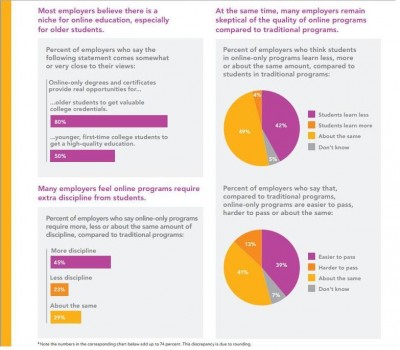Virtual learning is on the rise as more students enroll in online courses at both online and physical universities. The enthusiasm for online learning, including the increasing interest in MOOCs—free massive open online courses—has led some to question the future brick-and-mortar institutions.
But employers still like to see traditional, in-person educational experiences on the resumes of job candidates, according to a new survey.
The poll released by Public Agenda, an independent nonprofit research group, shows that 56 percent of employers prefer a job applicant with a degree from an average school where they attended physical classrooms rather than one from a more elite university where they took only online coursework. Only 17 percent prefer a degree from the latter.
Public Agenda surveyed more than 600 human resources staff at employers in four cities – Los Angeles, Detroit, Philadelphia and the El Paso-Las Cruces metropolitan area.
Proponents of online courses say the classes can be more accessible, sometimes cheaper and that they allow for personalization – a buzzword that refers to the ability to learn at your own pace and style. In addition, online coursework may provide more data about students that can point them in the direction of improving their performance. But 49 percent of employers thought students in online-only programs learned less compared to 45 percent who thought they learned about the same, suggesting many remain skeptical of the quality of such learning.
“Right now clearly our findings suggest [employers] are quite happy with the traditional model, maybe not for everybody, but overall that’s the safer bet for them,” said the lead researcher on the poll, Carolin Hagelskamp.
Employers interviewed in focus groups were more partial towards older job applicants who had online degrees, however, because they found applicants with prior work experience and the ability to juggle family obligations and school more impressive. They were split fifty-fifty about whether young people could get a high-quality education online because of the greater discipline it requires.
Community college students had mixed feelings about online courses. Hagelskamp said this demographic was particularly highlighted in the study because community colleges in particular have been undergoing innovations in how they deliver education. Forty-one percent of community college students surveyed said they would rather take fewer courses online, while 39 percent thought they were taking the right amount of online classes. (Although the sample size of community college students was only 215, Hagelskamp said it was weighted to be nationally representative.) Public Agenda will be conducting similar research on other demographics of college-goers in the future.
Nancy Zimpher, chancellor of the State University of New York (SUNY), which includes 29 community colleges in its system, said SUNY’s move to launch more online degree programs in the last 10 to 15 years is allowing them to accommodate the needs of students who do not wish to attend classes in person.
“We’re thinking about that market who for a whole host of reasons can’t come to campus, but needs to be educated,” Zimpher said at the New York Times Schools for Tomorrow conference last week. “We’ve got to do a lot better job of figuring out how to package an online experience that speaks to that market.”
Hagelskamp’s research suggests colleges must try even harder to give their students an online education experience worth their while.
“What stuck out to me was this feeling around community college students, there was almost a little bit of frustration around these courses,” Hagelskamp said. She said many students believe online courses require more discipline and quite a few said they’re harder to pass. Nearly half said they’re not learning as much as they would in a traditional setting.
“That combination shows there’s a lot of unhappiness with those courses,” she said. “So that raises a bit of a flag as we’re moving forward with online education.”




